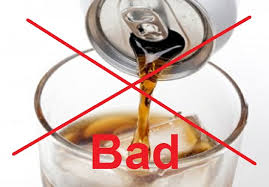There are chemicals and additives in so many of our processed foods that are not good for us but the artificial sweeteners in diet drinks are probably the worst.
In order to reduce the intake of processed sugar that can lead to obesity, our food companies have responded by using so-called safe substitutes such as aspartame (NutraSweet, Equal), saccharin (Sweet’N Low) and sucralose (Splenda) which are all just as bad for our health as sugar!
White sugars and sweeteners trigger two types of body responses:
1. Glycaemic Response: like sugar, a sweetener will over-elevate blood sugar and insulin levels.
2. Fat-Storing Response: with high blood sugar and high insulin levels the body starts to store fat for somewhere to put the sugar, and stimulates lipoprotein and other fat-stimulating enzymes and proteins.
When heated, aspartame turns into methanol and formaldehyde which are poisons to your body, so you should eliminate it from your diet, especially if you are experiencing any of these symptoms:
• headaches
• nausea
• vertigo
• hearing loss
• insomnia
• depression
• vision problems
• memory loss
• slurred speech
• mood changes
• anxiety attacks
• gastrointestinal disorders
• seizures
• skin lesions
• muscle cramps
• joint pain
• fatigue
• menstrual irregularities
• chest pain
• abnormal heart rhythm
So what can you have instead? Luckily there are more healthy alternatives and here are 4:
1. Stevia is a sweet herb, virtually calorie free and yet 200 times sweeter than sugar. It has beneficial effects on obesity and has even been proven to strengthen the immune system and lower blood pressure.
2. Agave Nectar has a low glycaemic index and human clinical trials shows that it does not raise the blood sugar or insulin levels in diabetics and does not trigger fat storage in adipose cells.
3. Sugar alcohols such as Erythritol and Xylitol have no effect on blood sugar, do not cause tooth decay and have no calorific value.
4. Yacon syrup is a fruit like vegetable and good for diabetics because it contains fructooligosaccharides a kind of sugar that you cannot digest so it does not affect blood sugar. It also has an inulin, a prebiotic fibre that helps digest other foods and enhances immunity because it promotes good bacteria in your digestive tract.
As a general rule, the closer a sugar is to its original whole food – the better it will be for you!

